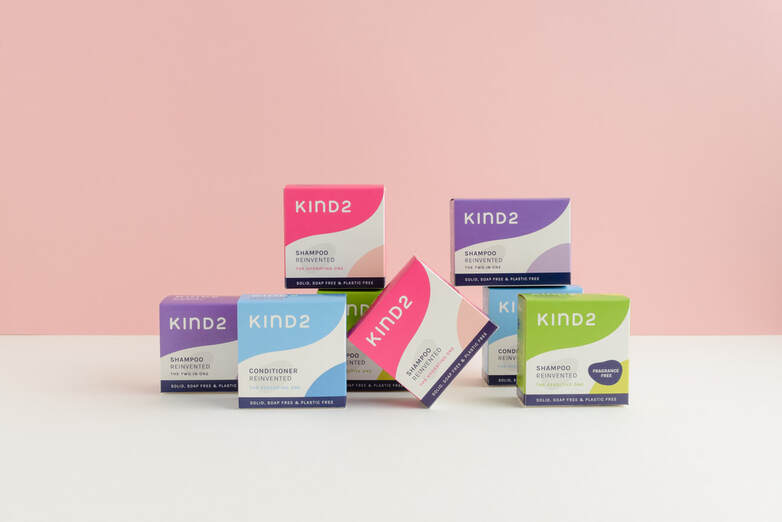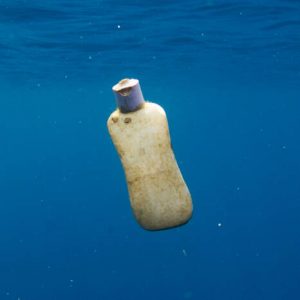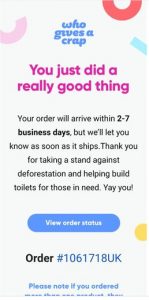
KIND2
Case study: How to communicate about your ethical products outside the eco chamber
The Challenge…
Your business is here to make a positive difference for the planet, so extolling the environmental values of your ethical business is essential…but is it limiting your ability to have greater reach and impact?
Your business is here to make a positive difference for the planet, so extolling the environmental values of your ethical business is essential…but is it limiting your ability to have greater reach and impact?
KIND2 sells high-quality shampoo bars with low-environmental impact (plastic and toxic chemical-free), inspired by founder Sue’s own experiences witnessing the scale of plastic pollution in Asia, and feeling called to make a change.
With this focus as the core value at the heart of the brand, the original marketing campaigns were heavily focused on the plastic-free messaging – proudly showing customers how many plastic bottles they could save if they switched to solid shampoo and conditioner bars instead.
Engagement with the messaging was good, but sales weren’t as high as they could be.

Taking action to understand the barriers
As part of her #EthicalHour membership, Sue brought this problem to a group coaching call with Founder and marketing strategist Sian Conway.
They quickly identified the problem. Most ‘conscious consumers’ had tried at least one shampoo bar in the past, in an effort to go plastic-free. But most products on the market were poor quality (despite being higher priced than most shampoos in plastic bottles), leaving shoppers disappointed and unwilling to try another option.
The plastic-free messaging was appealing to this target audience, which is why engagement was high, but without total confidence that the product would help them achieve their hair goals as well as the environmental impact they wanted to make, they were unwilling to make a purchase.

Sue identified a huge opportunity to start focusing on the hair benefits of her products in the messaging, as well as sharing case studies and verified customer reviews on the website. This plays into the principle of social proof and overcoming uncertainty (a huge behaviour change barrier) that people experience when trying something new.
These YOTPO customer reviews actually answer the uncertainty that many people will have when making a buying decision:

Better than expected!
Having used shampoo bars for the past two years I wanted to see if this one really did leave hair as soft as reviews said, as other bars I have used left my hair a little wiry. It does! So surprised just how soft it leaves my hair, and that’s without conditioner.
5 star review by Lorna G. – Verified Buyer
17 Jan 2021


Solid conditioner that actually works!
I was sceptical about a solid conditioner because I have quite fine hair – but it’s actually amazing! Leaves my hair soft and smooth without weighing it down. Officially converted.
5 star review by Ariel H. – Verified Buyer
12 Jan 2021

KIND2 owner Sue Campbell joined the Behaviour Change for Ethical Business workshop in late 2020 and identified further opportunities to:
- Remove the barriers associated with behaviour change
- Change the ‘plastic is bad’ narrative to one focused on positive change
- Reinforce the positive feelings in the post-purchase email
The transformation to the customer experience
Reducing friction
One of the principles we talked a lot about in the workshop was the friction to change.
I regularly cite Behavioural psychologist Dan Ariely, who says:
“we must assume that people:
- have low motivation
- have low patience
- hate doing anything
- try to complete tasks as quickly as possible”
In other words, we have to remove the friction from a behaviour and design “a path of least resistance”. (Dan Ariely on Changing Customer Behavior)
KIND2 have taken this on board and have set up a subscription service for their customers at the checkout phase, to reduce the friction of remembering to repurchase, a brilliant idea as it’s generally in the shower when a customer remembers they are low on a shampoo bar!
Focusing on the positive

It’s easy to want to highlight the big issues to drive action, but this can actually be counter-intuitive. Focusing on how bad the plastic problem is can lead to negative social proof, inaction and despair – because it seems that the problem is so bad and no-one is taking action.
KIND2 focuses on positive environmental messaging as well as the benefits of using the bars for the feel-good factor, which opens up the market-place to those who aren’t just on a reducing plastic journey.
Their product still reduces the amount of plastic their consumers use, so the positive outcomes are the same – and they can still report how many bottles they’ve saved in their impact reports – but by pivoting their marketing messaging to something more positive, they can reach more people, increase sales and grow their impact further!
Anchoring the feel-good factor
In the workshop, Livvy shared how Who Gives a Crap have nailed the peak-end rule by anchoring the post-purchase email with a positive message about the planetary and social benefits.
This plays into our brain’s ability to only remember key moments – the peak and the end. After spending £37 on bottom wiping, Who Gives a Crap anchors this as a positive memory by celebrating the action and leaving customers feeling good about themselves. Which means when the purchase is considered the lasting memory will be the positive feeling.
Hearing this in a workshop, Sue has been developing her thank you emails to include messages about the trees they are planting and the plastic pollution saved.


Doing the Behaviour Change Workshop really helped me think about how I can communicate more positive reinforcement to both customers and prospects – in all aspects of our branding, including social media and transactional emails. For the most part, people who have found and engaged with our brand are already on board with reducing their plastic usage or consuming with less impact, they don’t need more of the “plastic is bad” narrative. They do, however, want to feel good about the eco-friendly choices they’ve made and have great hair at the same time.
Sue Campbell, Founder KIND2

Are you an ethical business keen to reach a wider audience?


